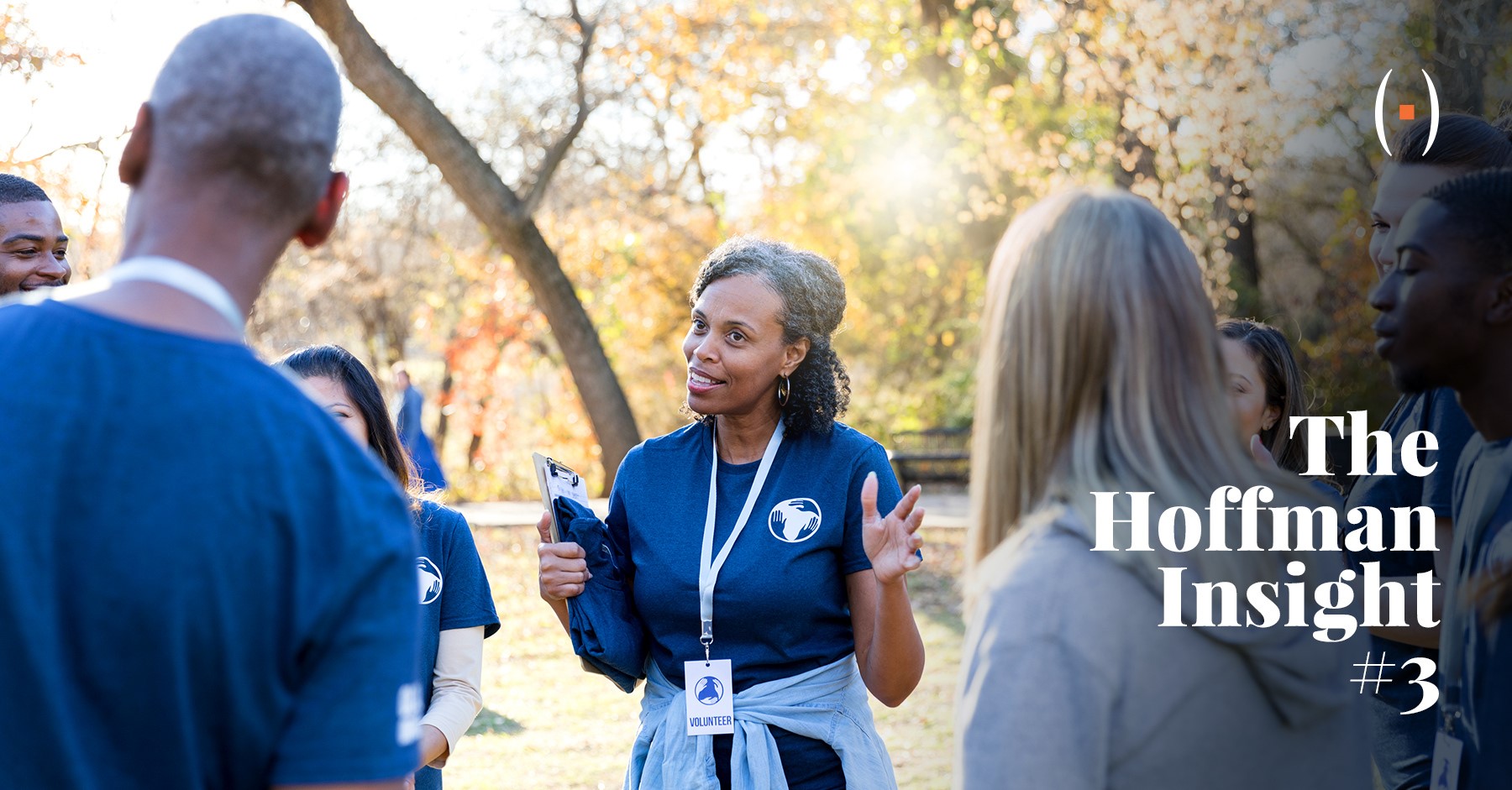Bringing Aboard Excellence: Leadership Recruitment Challenges in NPOs
Non-profit organisations (NPOs) face unique challenges when it comes to attracting and retaining top talents for key leadership roles. Meanwhile, candidates considering transitioning into or applying for top positions within NPOs often have misconceptions about the day-to-day realities of these roles.
Addressing these issues requires a deep understanding of the needs and expectations of both parties, and it also means looking beyond NPOs’ boundaries to find top-tier talent with the perfect blend of expertise and experience. Utilising the services of executive search firms with a proven track record in advising NPOs can help professionalise and streamline the recruitment process.
Ineke Arts and Jean-Michel Lucas, Partners at Hoffman, join forces to provide expert insights into the recruitment process from both the perspectives of NPOs and candidates (1).

![]()
1. Breaking down the “leadership challenge” in NPOs
Finding the right leaders for non-profit organisations goes beyond meeting specific criteria. The unique demands of NPOs, combined with internal and external obstacles or challenges, make the search for the perfect fit a complex task.
OPERATING IN A HIGHLY COMPETITIVE ENVIRONMENT, UNDER PUBLIC SCRUTINY
Companies are not the only entities vying for the best and the brightest; it is also a competition among NPOs. Given that they often rely on public funds and are subject to stringent oversight, they also feel extra pressure to demonstrate equity, diversity and inclusion (EDI) (2).
FROM RESOURCE LIMITATIONS TO NAVIGATING COMPLEX STAKEHOLDER RELATIONSHIPS
Limited budgets can constrain an organisation’s capacity to offer competitive compensation packages, potentially deterring the best talents. Additionally, many NPOs lean on their established networks for recruitment and tend to incorporate a «N-1» level consensus approach in their final decision-making process. An overreliance on these methods not only extends the vetting process but also narrows the candidate pool, decreasing diversity in background and experience.
THE PERFECTLY BALANCED SKILLSET
The perfect match for NPOs is a candidate who possesses a mix of specific traits, with a strong sense of mission being a key factor. Leadership style is crucial, often manifesting in NPOs as transformational, participative, charismatic, servant or transactional (goal-setting focused)(3). The best candidates set themselves apart by combining these traits with robust management skills and versatile communication abilities. The latter enables them to make an impact in any context, including more “traditional” or conservative settings that are vital for fundraising. It is no wonder that this distinctive profile is commonly referred to as the «managerial leader» (4).
“When evaluating potential candidates interested to move to the NPO sector, it is of great importance to nsure that they have a strong link with the specific mission and purpose of the NPO. This is a critical factor in the level of passion and commitment that will be expected in the role, next to possessing the right leadership skills, which are paramount and even more than in traditional industries, because so much is at stake here.” Ineke Arts

2. Addressing candidates’ expectations
In general, a substantial number of candidates harbour unrealistic or misguided expectations about the job. This misalignment between their preconceived notions and the reality of the position often leads to disappointment and potential challenges down the road.
MORE MEANINGFUL THAN THE PAYCHECK?
Lower compensation packages than typically offered in the for-profit sector can fall short of basic expectations and be a deal-breaker. In addition, many candidates grossly underestimate the workload associated with the job and the sheer magnitude of personal and emotional involvement, which further compounds the issue.
GAUGING THE LEVEL OF COMMITMENT
Leadership positions in NPOs involve dedicating extensive hours to the cause, including through the weekend, and actively engaging in fundraising events. Needless to say, this level of commitment can significantly impact work-life balance and become all-consuming. It is important to understand that such roles require both time and energy and should not be approached as a casual late-career switch or part-time endeavour.
READINESS TO ABSORB AND ADAPT TO NEW WORKING DYNAMICS
For professionals who have spent most of their careers in the for-profit sector, transitioning to the world of NPOs may prove challenging and overwhelming. Establishing and managing relationships within an NPO Board can be a marked departure from their prior experiences. Moreover, working alongside mission-driven people brings its own set of nuances. Their strong dedication to the cause has a profound impact on interactions, calling for new recruits to adjust their approach to collaboration, communication, and management.
“We have people driven by a desire to “give back”, serve the community and support charitable causes. Unfortunately, many of them often lack clarity regarding their true aspirations and underestimate the challenges unique to these organisations or to the position itself. Those coming from the corporate world might experience cultural shock and, despite their best intentions, might simply not thrive in
these demanding environments.” Jean-Michel Lucas

3. Professionalising the recruitment process
With extensive experience in recruiting leaders for NPOs and a steadfast commitment to this sector, Hoffman possesses a deep understanding of the potential challenges, warning signs, overlooked factors and missing tools that are critical for achieving success. Our Partners seek to streamline the recruitment process and effectively bridge the gap between candidates and organisations in multiple ways:
HELPING BOTH PARTIES GET CLARITY ON WHAT THEY NEED OR CAN EXPECT
While it is crucial to give candidates a clearer understanding of what to expect, NPOs should also avoid placing too much emphasis on certain attributes, such as prior charity experience, at the expense of others. Despite the fact that management skills are absolutely essential, they often take a backseat, which can adversely impact outcomes and leadership effectiveness.
EXPANDING THE POOL OF TALENTS AND RATIONALISING THE RECRUITMENT PROCESS
As a generalist recruiter, Hoffman extends the search horizon to identify the ideal candidate with the right skillset. We also assist in securing «neutral judgment» or «fairness» – a particularly prominent concern within NPOs – through standardised assessments and tools.
EXPEDITING THE DECISION-MAKING PROCESS
Emotional intelligence and empathy are highly valued in NPOs. But these values can occasionally add complexity to tough decisions, like turning down candidates or picking between equally talented individuals. That is where we come in. As a seasoned external partner, Hoffman helps steer the decision-making process to a successful outcome while adhering to the highest standards of fairness and objectivity.
![]()
In the aftermath of Covid-19 and with the evolving expectations of younger generations such as millennials and Gen X, a timely opportunity has emerged for NPOs.(5) It might allow them to attract talented individuals more easily, benefiting from the shifting priorities towards seeking purpose and meaning in their endeavours. Yet, seizing this opportunity requires professionalising the recruitment process to tap into the broader pool of talents and attract the best-fitted leaders.
Please feel free to contact us if you wish advice and professional support in finding the leaders who will make a durable and meaningful impact.
Ineke ARTS | ia@hoffman.be |
Jean-Michel LUCAS | jml@hoffman.be |
Michel GRISAY | mg@hoffman.be |
Mieke DHOORE | md@hoffman.be |
Stefaan VERDUYN | sv@hoffman.be |
Denis GALLANT | dg@hoffman.be |
Bart DELALEEUW | bd@hoffman.be |
Boulevard de la Woluwe 62, 1200 Brussels – Kouter 7, B101, 9000 Ghent
www.hoffman.be | + 32 2 779 52 52
(1) These insights are based on the specific experiences of contributors from recent collaborations with various foundations, associations, charities, and NGOs. However, they may not necessarily apply to all organisations categorised as NPOs.
(2) It is worth noting that in the pursuit of gender equality, NPOs might be struggling to increase male representation. IIC Partners (2020) How to Attract and Retain Top Talent at Not-For-Profit Organizations. [online] https://iicpartners.com/media-center/how-to-attract-and-retain-top-talent-at-not-for-profit-organizations/
(3) While seemingly counterintuitive, this leadership style is particularly effective when it comes to fundraising. Central Michigan University Blog (2023), What kind of leader are you? Five Leadership Styles for Non-Profits. [online]https://www.cmich.edu/blog/all-things-higher-ed/five-leadership-styles-for-nonprofits#:~:text=Transformational%20leadership,every%20part%20of%20their%20job.
(4) See the “manager-leader composite model” in: Crawford, J. (2010) Profiling the non-profit leader of tomorrow. Ivey Business Journal. [online] https://iveybusinessjournal.com/publication/profiling-the-non-profit-leader-of-tomorrow/
(5) Eakin, E. (2022) How to turn the great resignation into the great attraction, Philanthropy World Digest. (online) https://philanthropynewsdigest.org/features/the-sustai-nable-nonprofit/how-to-turn-the-great-resignation-into-the-great-attraction